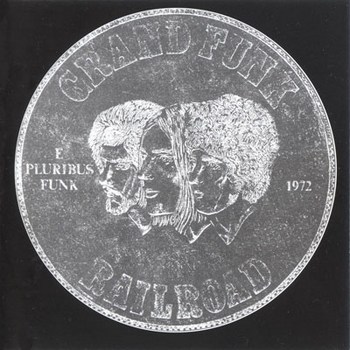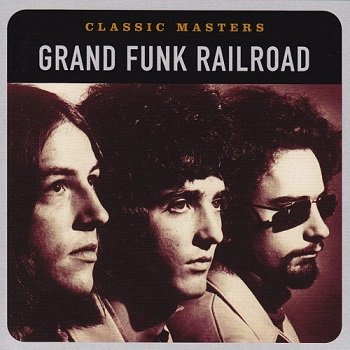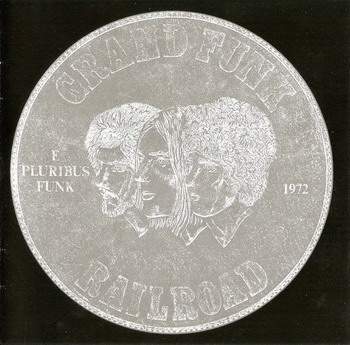Nils Lofgren: Albums Collection - 7 Albums Mini LP SHM-CD + 9CD/DVD Deluxe Edition Box Set 2014
Lossless Galaxy Release Nils Lofgren: Albums Collection 7 Albums Mini LP SHM-CD + 9CD/DVD Deluxe Edition Box Set Performer: Nils Lofgren Box / Albums: 2014 Face The Music (9CD + DVD Deluxe Edition Box Set Fantasy Records) ------------------------------------------- 1973 Gone Crazy ● 1975 Nils Lofgren ● 1975 Back It Up!! 1976 Cry Tough ● 1977 I Came To Dance 1977 Night After Night 2CD ● 1979 Nils (Mini LP SHM-CD Universal Music Japan 2014) Info: A"> Каждый альбом можно скачать отдельно
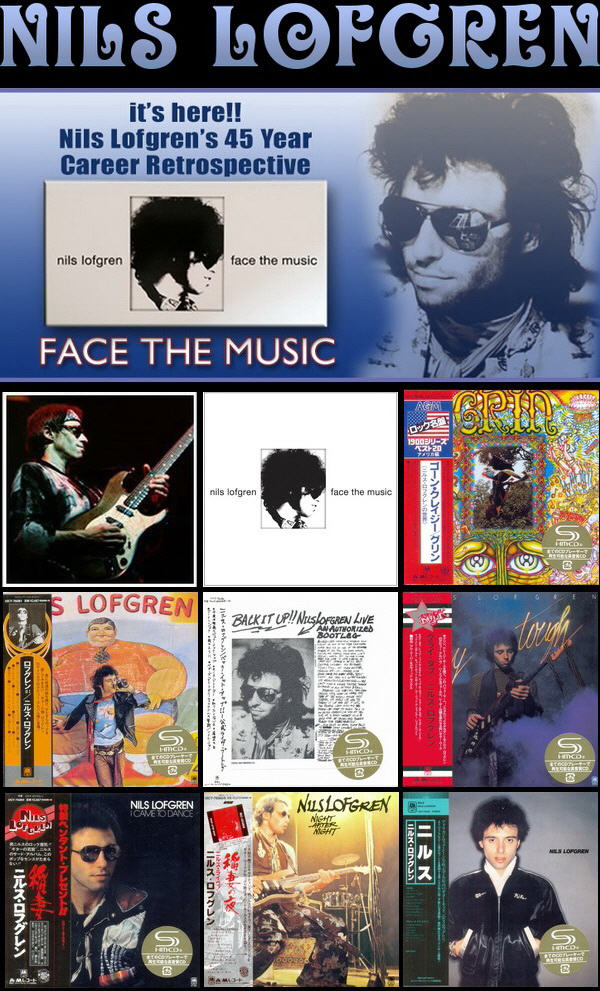
Nils Lofgren: Albums Collection - 7 Albums Mini LP SHM-CD + 9CD/DVD Deluxe Edition Box Set 2014
Lossless Galaxy Release Nils Lofgren: Albums Collection 7 Albums Mini LP SHM-CD + 9CD/DVD Deluxe Edition Box Set Performer: Nils Lofgren Box / Albums: 2014 Face The Music (9CD + DVD Deluxe Edition Box Set Fantasy Records) ------------------------------------------- 1973 Gone Crazy ● 1975 Nils Lofgren ● 1975 Back It Up!! 1976 Cry Tough ● 1977 I Came To Dance 1977 Night After Night 2CD ● 1979 Nils (Mini LP SHM-CD Universal Music Japan 2014) Info: A"> Каждый альбом можно скачать отдельно
04 10, 2025
Electric Light Orchestra: The Classic Albums Collection ● 11CD Box Set Sony Music 2011
Lossless Galaxy Release Electric Light Orchestra: The Classic Albums Collection 11 Albums / 11CD Box Set Sony Music Performer: ELO / Electric Light Orchestra Box: The Classic Albums Collection (11CD Box Set Sony Music) Albums: 1971 No Answer (The Electric Light Orchestra) 1973 ELO II ● 1973 On The Third Day 1974 Eldorado - A Symphony By The Electric Light Orchestra ● 1975 Face The Music 1976 A New World Record ● 1977 Out Of The Blue ● 1979 Discovery 1981 Time ● 1983 Secret Messages ● 1986
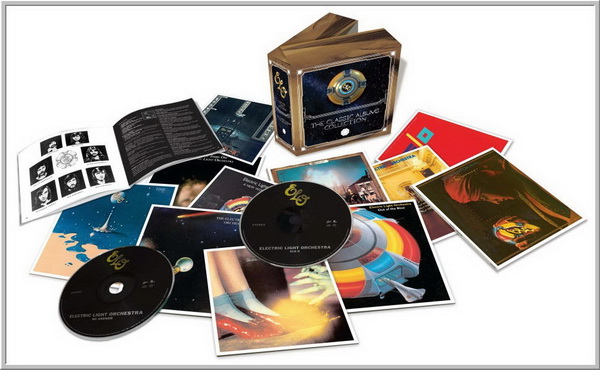
Electric Light Orchestra: The Classic Albums Collection ● 11CD Box Set Sony Music 2011
Lossless Galaxy Release Electric Light Orchestra: The Classic Albums Collection 11 Albums / 11CD Box Set Sony Music Performer: ELO / Electric Light Orchestra Box: The Classic Albums Collection (11CD Box Set Sony Music) Albums: 1971 No Answer (The Electric Light Orchestra) 1973 ELO II ● 1973 On The Third Day 1974 Eldorado - A Symphony By The Electric Light Orchestra ● 1975 Face The Music 1976 A New World Record ● 1977 Out Of The Blue ● 1979 Discovery 1981 Time ● 1983 Secret Messages ● 1986
04 10, 2025
Free: 2002 Disk Union Promo Box - 7 Mini LP CD Universal Music Japan Box Set
Free: 2002 Disk Union Promo Box 7 Mini LP CD Universal Music Japan Box Set Performer: Free Box: 2002 Disk Union Promo Box (7 Mini LP CD Universal Music Japan Box Set) Albums: -------------- ☆☆☆☆☆☆☆☆☆☆☆ -------------- 1968 Tons Of Sobs ● 1969 Free Universal Music Japan UICY-9130/9131 Island Records / Universal Music Japan -------------- ☆☆☆☆☆☆☆☆☆☆☆ -------------- 1970 Fire And Water ● 1970 Highway Universal Music Japan UICY-9132/9200 Island Records / Universal Music Japan --------------
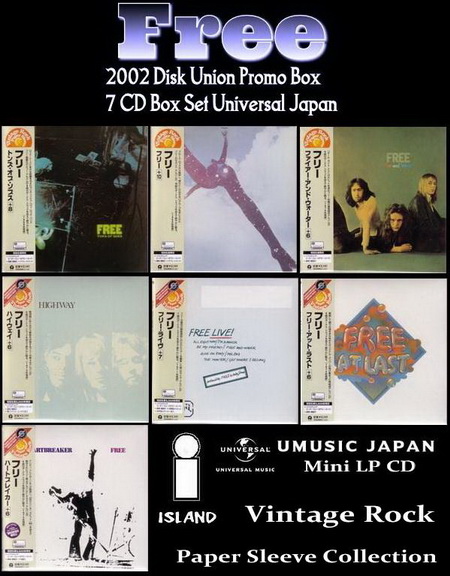
Free: 2002 Disk Union Promo Box - 7 Mini LP CD Universal Music Japan Box Set
Free: 2002 Disk Union Promo Box 7 Mini LP CD Universal Music Japan Box Set Performer: Free Box: 2002 Disk Union Promo Box (7 Mini LP CD Universal Music Japan Box Set) Albums: -------------- ☆☆☆☆☆☆☆☆☆☆☆ -------------- 1968 Tons Of Sobs ● 1969 Free Universal Music Japan UICY-9130/9131 Island Records / Universal Music Japan -------------- ☆☆☆☆☆☆☆☆☆☆☆ -------------- 1970 Fire And Water ● 1970 Highway Universal Music Japan UICY-9132/9200 Island Records / Universal Music Japan --------------
04 10, 2025
Жанры
Lossless Galaxy Release
Русская музыка
--Поп
--Рок
--Панк
--Альтернатива
--Металл
--Рэп, Хип-Хоп, R'n'B
--Джаз и Блюз
--Фолк
--Шансон, Авторская песня
--СССР
Зарубежная музыка
--Pop
--Rock
--Hard Rock
--Progressive & Art-Rock
--Pop-Rock & Soft Rock
--Instrumental Rock
--Heavy, Traditional, Industrial Metal
--Power, Gothic, Sympho Metal
--Thrash, Speed, Groove, Modern Metal
--Death, Melodic Death, Doom, Dark Metal
--Black, Pagan, Folk, Viking Metal
--Alternative
--Punk
--Disco, Eurodance
--Rap, Hip Hop, R'n'B
--Reggae, Ska, Dub
--Jazz, Blues, Soul
--Folk, Country, Ethnic
--Electronic, Ambient, New Wave
--House, Techno, Trance
Другие жанры
--New Age, Relax, Meditative & Flamenco
--Chillout, Lounge, Downtempo, Trip-Hop
--Drum & Bass, Jungle, Breakbeat, IDM
--Classical / Классическая музыка
--Soundtrack
--Музыкальные сказки
Vinyl Rip
HI-Res / DVD-Audio / DTS
--SACD
--DSD
--DVD-Audio
Сборники Lossless-Galaxy
Альбомы 2022
Альбомы 2023
Альбомы 2024
Теги
1st Press 2022 2023 2024 2025 70... AOR Black Metal Blues Blues Rock Bootleg Series Classic Rock Death Metal Discography Exclusive for Lossless-Galaxy Folk Rock Fusion Hard Rock Heavy Metal Hi-Res Japanese Edition Jazz Jazz Rock lossless Melodic Death Metal Melodic Rock Modern Electric Blues Pop Pop Rock Power Metal Prog Rock Progressive Metal Progressive Rock Psych Rock Psychedelic Rock Rock SACD Symphonic Metal Thrash Metal Дискографии от KoGGaN
Архивы
Опрос
В каком формате хотели бы видеть релизы на сайте ?
 Автор: LeddZepp, 7 марта 2021, Комментариев: 0, Просмотров: 603
Автор: LeddZepp, 7 марта 2021, Комментариев: 0, Просмотров: 603Grand Funk Railroad - Phoenix (1972)
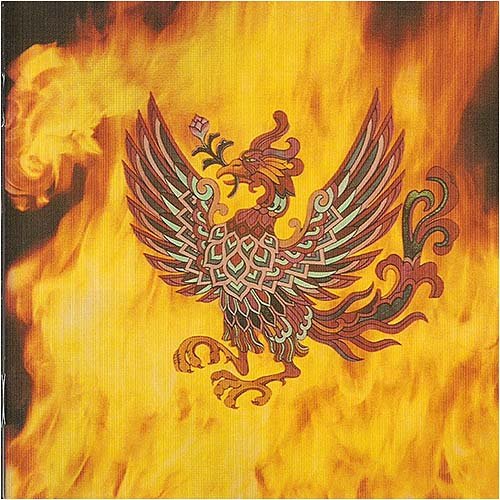
Year: September 15, 1972 (CD 2002)
Label: Capitol Records (Europe), 72435-41723-2-8
Style: Hard Rock, Rock
Country: Flint, Michigan, U.S.
Time: 46:39
Format: Flac Tracks 16/44,1 kHz
Size: 302 Mb
Phoenix — шестой студийный альбом американской группы Grand Funk Railroad, выпущенный в сентябре 1972 года на лейбле Capitol Records.
Для записи альбомы были привлечены два сессионных музыканта — органист Крейг Фрост и скрипач Дуг Кершоу.
Диск занял 7-е место в американском чарте Billboard 200.
Композиция "Rock & Roll Soul" была выпущена в качестве сингла и поднялась до 29 позиции в чарте в 1972 году.
(ru.wikipedia.org)
Phoenix (Феникс) - 6-й студийный альбом американской рок-группы Grand Funk, записан летом 1972 года, и выпущен в сентябре (15.9/1972) на лейбле Capitol Records. Это первый альбом, записанный без участия бессменного продюсера Терри Найта, в качестве продюсеров выступили сами музыканты группы, поэтому его звучание так разительно отличается от звучания всех предыдущих альбомов. Для записи альбома были привлечены два сессионных музыканта - органист Крэйг Фрост и скрипач Дуг Кершоу. Впрочем, первоначально на роль клавишника намечался известный британский мульти-инструменталист Питер Фрэмптон, но по не зависящим от группы причинам это назначение не состоялось.
...Поначалу популярность нового диска была умеренной, так как многие фанаты посчитали, что без Терри Найта группа не в состоянии произвести нечто достойное их внимания. Для раскрутки альбома пришлось организовать большое турне по США, и только тогда продажи альбома резко увеличились. Диск занял 7-е место в американском чарте Billboard 200. Композиция "Rock & Roll Soul" была выпущена в качестве сингла, и поднялась до 29 позиции в чарте в 1972 году. Альбом Phoenix ознаменовал собой переход от простой, но энергичной ("американской ковбойской") музыки к музыке более сложной и техничной ("британское направление").
(rock-musicland.com/gfr/06-phoenix.html)
01. Flight Of The Phoenix (03:38)
02. Trying To Get Away (04:11)
03. Someone (04:04)
04. She Got To Move Me (04:48)
05. Rain Keeps Fallin' (03:25)
06. I Just Gotta Know (03:52)
07. So You Won't Have To Die (03:21)
08. Freedom Is For Children (06:06)
09. Gotta Find Me A Better Day (04:07)
10. Rock 'N' Roll Soul (03:40)
11. Flight Of The Phoenix (2002 Remix with Extended Ending) (05:21)



При желании можно посмотреть все мои публикации на сайте. Приятного прослушивания. Жмём и смотрим (Click to see all of my posts)!
Внимание! У Вас нет прав для просмотра скрытого текста.
Похожие новости:
Комментарии отсутствуют
Добавить комментарий!
Информация
Посетители, находящиеся в группе Гости, не могут оставлять комментарии к данной публикации.

